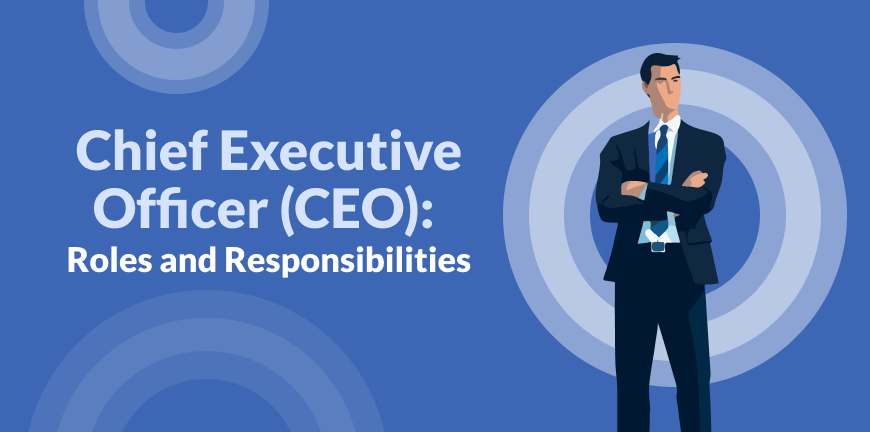
What is Zoho CRM Plus Features, Modules & Capabilities
23/07/2025
What is the Role of AI in Staff Augmentation?
26/07/2025“The best CEOs are the ones who can build a firm that is greater than the sum of its parts”- Elon Musk
A CEO a.k.a. Chief Executive Officer, is like the captain of a cruise ship, navigating the company’s business journey & ensuring it traces an upward curve & any obstacle hampering the progress is removed diligently without causing any operational disruption.
The success or failure of a company hinges on the CEO’s performance to a large extent, both from a leadership and strategic perspective. Any wrong move or decision by a CEO can dent the company’s future plans and brand reputation.
Let’s understand CEO roles and responsibilities from a business POV so that companies can hire the right CEO ideal for their business setup using the “horses for courses” approach.
What Is a Chief Executive Officer (CEO)?
The definition of the CEO role is straightforward, and it states that ” A CEO is the highest-ranking executive within an organisation holding complete responsibility for managing all departments, taking critical business decisions, and upholding the company’s vision “. The key CEO roles and responsibilities include:
- Strategic Leadership
- Resource Management
- Decision-Making
- Performance Management
- Organisational Culture
- Stakeholder Communication
The role of a CEO in implementation of strategy includes, but is not limited to, ensuring cross-functional teams are on the same page, allocating monetary & human resources efficiently, monitoring progress from 360 perspective, fixing issues, & ensuring organisational culture fosters inclusivity from all aspects.
What Are the Major CEO Roles and Responsibilities?
The role of CEO in an organization may not be predefined but rather set according to the business goals and from a strategic standpoint. The role of a startup CEO may be vastly different from the role of CEO in a multinational organisation.
A CEO is responsible for both the success and the failure of the business, and hence CEO role description must be clearly defined before finalising the right candidate for this esteemed position in a company.
However, there are some core CEO role responsibilities that every CEO must carry out to ensure continued growth and success for the company. The key CEO roles and responsibilities include:
1. Setting & Execution of Organisational Vision and Strategy
Along with defining the organisation’s vision, mission, and values, the role of CEO in a company is to embody them to inspire every employee to follow in his/her footsteps.
Decisions such as the launch of a new product or a department, generating and maintaining a competitive advantage, searching for new markets, seizing new opportunities, addressing & mitigating risks smartly, etc., fall under the purview of a CEO.
As with any company, CEOs rely heavily on data and inputs from senior leadership groups who manage affairs of different departments, as well as directions provided by the board of directors. However, the role of CEO in business is to make decisions, and hence, CEOs have operational control over strategy & execution.
2. Building the Senior Leadership Team
One of the major CEO role responsibilities is to attract and retain top talent within an organisation. Although, CEO role in strategic planning is significant, building a robust senior executive leadership team is equally important to achieve business goals and maintain consistent growth.
As the CEOs can’t oversee the activities and progress of each employee, they form a team of other C-suite leaders, such as the CFO (Chief Financial Officer), the COO (Chief Operating Officer), the CTO (Chief Technology Officer), the Chief Strategy Officer (CSO), etc., to manage business operations more effectively.
The role and function of CEO is to guide and provide valuable insights to the senior leadership team to ensure business goals are achieved and project timelines are followed according to the final execution plan.
3. Making Capital Allocation Decisions
While the senior leadership team manages the budget of their respective team, CEOs are responsible for making capital allocation decisions for the entire organisation to effectively execute the strategic initiatives. Additionally, the CEO has a free hand in making decisions on adding more funds to meet additional capital requirements, such as repaying debt, share repurchases, business expansion, etc.
4. Effective Communication with Stakeholders
A CEO is regarded as the face of the company. They represent the firm and act as a single point of communication with the public, employees, managers, lawmakers, internal & external stakeholders, end customers, suppliers, vendors, and any other party interested in the company’s affairs.
CEO vs. Other C-Suite Roles: 5 Key Differences
The rest of the C-Suite leaders and CEO roles and responsibilities may look similar on the surface, but there are subtle differences in terms of impact and consequences of failed actions. Here are the major differences between the CEO vs. Other C-Suite Roles
| Aspect | CEO | Other C‑Suite Roles |
| Decision Scope | Drives company-wide vision and direction. | Focus on specific departmental strategies and operations. |
| Accountability | Answers directly to the board of directors. | Report progress and results to the CEO. |
| Strategic Focus | Shapes and defines long-term organisational goals. | Executes operational plans within functional areas. |
| External Representation | Represents the organisation globally to stakeholders and media. | Manages visibility within their functional domain. |
| Resource Allocation | Prioritises overall investments and resource distribution. | Manages budgets and resources for their functions. |
What are the 5 Key Skills Necessary for a Chief Executive Officer?
CEO roles and responsibilities become more diversified as the company expands towards new market horizons. The role of CEO transcends a 9-5 job & requires a special set of skills, especially during critical times. Here are the 5 crucial skills every CEO must have in their quiver to overcome complex challenges & enjoy sustained success from a 360-degree business perspective:
1. Strategic Planning & Execution
A CEO role in strategy planning is similar to the role of a captain or coach of a sports team. The main objective is to constantly strive for excellence & destroy hurdles with diligence and firm decision-making. A CEO must possess strong skill sets to develop a robust strategic plan with a foresight that helps the company drive growth that far exceeds expectations.
However, coming up with an effective strategic plan gives you only a launch pad doesn’t win you the battle; ensuring smart execution from every level will seal the deal & help the company achieve the desired results in terms of business growth & brand value enhancement. A CEO must ensure the entire team is always motivated & works towards achieving the business goals with utmost sincerity and effort, leaving nothing to chance. Additionally, a CEO must be in a position to make informed decisions in critical times and take calculated risks to help the company get out of tough situations and generate desired outcomes.
2. Financial management
The role of CEO in an organisation is not only to devise strategies but also to manage the finances effectively. CEOs must ensure budget planning is on point and resources are utilised effectively to maximise returns and minimise risks. Additionally, CEOs must have the ability to explain the financial performance to stakeholders clearly and transparently.
3. Leadership and Team Management
A CEO must have exceptional team management & leadership skills to keep the entire workforce motivated to achieve excellence. CEOs must be able to build a great rapport with the senior leadership group, stakeholders, clients, and partners, creating a culture of trust & long-term association. Additionally, CEOs must be able to delegate tasks effectively to ensure employees and managers take ownership and achieve the best results.
4. Problem-Solving & Decision-Making
A CEO must have the ability to identify, analyse, & mitigate gaps and risks quickly and effectively. CEOs must be able to make tough calls and take calculated risks, balancing the rewards and risks of each decision. They must also be able to steer their team through tough situations, keeping everyone motivated and focused at all times.
5. Communication and Presentation Skills
A CEO must have excellent communication and presentation skills, be able to share their vision and goals effectively with employees, leadership teams, stakeholders, and customers. Also, CEOs must be able to articulate their ideas, plans, and strategies clearly and concisely, which inspires others and compels them to follow them diligently.
What are the 4 Types of Chief Executive Officer?
Every company has its own unique business needs based on the sector, and the type of CEO required to manage operations also varies accordingly. Companies must make the right choice of a CEO who can balance both technical and managerial aspects to make the business flourish in the volatile market arena. Here are the 4 different types of CEOs that shape the business growth in their unique ways:
1. Founder CEO
A Founder CEO is the visionary who starts the company from scratch, either single-handedly or through a profit-sharing partnership. CEO roles and responsibilities in such cases will be left to their discretion as they exactly know what’s required to take the business forward.
These CEOs shape the company’s culture, mission, & long‑term goals while steering innovation, team building, and early‑stage growth strategies from inception.
2. Technical CEO
A Technical CEO is ideal for companies that offer technical products or services. These types of CEOs have a strong technology acumen, bring innovation to the forefront, product development, & engineering excellence. Also, they combine business aspirations with technical capabilities and run the operations from both technical and managerial aspects.
CEO roles and responsibilities in the tech domain include guiding R&D investments, building technical roadmaps, & ensuring the company remains ahead of competitors through technical advancements & digital transformation.
3. Finance/Operations‑Focused CEO
This type of CEO specialises in financial management & operational efficiency. The role and function of the CEO in the financial wing include streamlining processes, creating a senior leadership team, managing budgets, allocating & optimising resources, and deploying necessary systems. These strategies aim at boosting profitability, scalability, & compliance while maintaining organisational stability.
Financial CEOs focus on cost management, strengthen risk mitigation systems, and ensure every operational decision synchronises with overall business growth & shareholder value.
4. Go‑to‑Market CEO
A Go‑to‑Market CEO takes responsibility for driving sales, marketing, & client acquisition initiatives. They develop compelling market strategies to outsmart competitors, enhance brand presence, & accelerate revenue growth by aligning products & services with market demand.
The CEO role responsibilities under the go-to-market domain include setting & leading cross‑functional teams, developing innovative campaigns, & leveraging data insights to expand market share and outperform competitors consistently.
Key Takeaways
- CEOs drive organisational vision, strategy, and execution, directly influencing long-term growth and success.
- A CEO’s leadership impacts culture, stakeholder trust, market reputation, and overall operational efficiency significantly.
- Different types of CEOs: Founder, technical, financial, or go‑to‑market. They bring unique expertise to companies.
- Effective CEOs build strong leadership teams, allocate resources wisely, and ensure compliance with strategic business goals.
- CEO skills in communication, decision‑making, financial management, and problem‑solving are crucial for sustainable business performance.
Frequently Asked Questions
1. What is the Impact of a CEO Change?
A CEO change often shifts company vision, culture, investor confidence, and operational strategy, influencing growth direction and market performance significantly.
2. What Does a CEO Do?
CEO roles and responsibilities include setting strategy, driving execution, managing resources, aligning teams, building stakeholder trust, and ensuring sustainable growth with strong governance.
3. Is the CEO the Owner of the Company?
A CEO may or may not be the owner of a company. They may be hired or appointed, while ownership lies with shareholders, founders, or investors controlling equity stakes.
4. Is the CEO or the CFO a Higher Position?
A CEO has a higher position, overseeing the entire organisation, while a CFO specifically manages finances, reporting directly to the CEO typically.
5. What Position Is Higher Than CEO?
In some organisations, the Board Chair or company owner holds greater authority, overseeing and guiding the CEO’s strategic decisions overall.
6. Who Do CEOs Report To?
CEOs usually report to the company’s Board of Directors, which evaluates performance, approves strategies, and ensures shareholder interests are protected.
7. What is the CEO’s Salary and Job Outlook?
CEO salaries vary widely, often substantially, with bonuses and stock options. The job outlook remains competitive, requiring proven leadership and innovation.
Contact Us For Business Enquiry

Rajkumar Shanmugam
Rajkumar Shanmugam is the Head of HR at ALP Consulting, bringing over 19 years of comprehensive HR leadership experience across India and international markets. His expertise spans talent acquisition, employee relations, performance management, compliance, and HR transformation. Rajkumar has a proven track record of driving people-centric initiatives, enhancing workplace culture, and aligning HR strategy with business goals. With extensive experience in US staffing operations and global mobility, he continues to lead organizational excellence through innovation and employee engagement.




